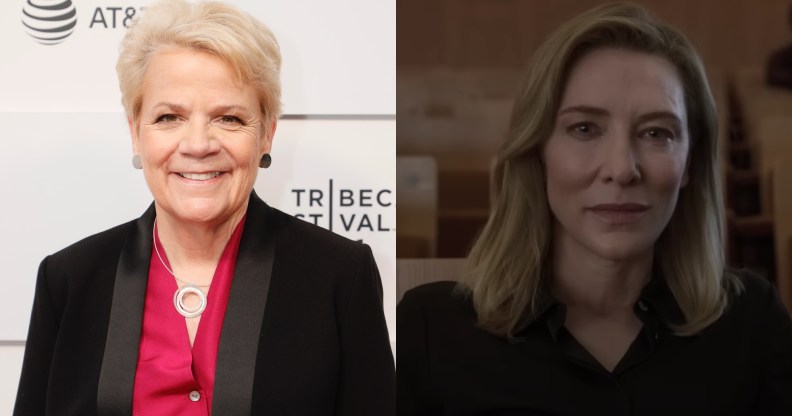Lesbian conductor name-checked by Cate Blanchett in Tár blasts film for ‘heartbreaking’ storyline

Marin Alsop (L) has criticised the filmmakers of Tár for portraying the lead character as an abusive figure. (Getty/Focus Features)
World-class female conductor Marin Alsop has said she is “offended” by the plot of Cate Blanchett’s new movie Tár.
In the film, Blanchett plays lesbian conductor Lydia Tár whose career slowly disintegrates following a string of abuse allegations, instigated by a former student.
As she becomes wrapped up with her student Olga (Sophie Kauer), her relationship with her wife (Nina Hoss) also begins to unravel.
Although Lydia doesn’t exist, her story has several parallels to Marin Alsop – also a New York-based lesbian conductor who thrived under the mentorship of conductor Leonard Bernstein.
And despite Alsop never being contacted to consult on the movie, she is name-checked in the first half hour of the film.
The psychologically daunting plot of Tár may have secured Blanchett a Golden Globe for her performance but the filmmakers have been called out by Marin Alsop in a new interview with The Times.
“So many superficial aspects of Tár seemed to align with my own personal life. But once I saw it I was no longer concerned, I was offended. I was offended as a woman, I was offended as a conductor, I was offended as a lesbian,” she said.
Given the lack of mainstream media portraying female musicians, Alsop expressed her frustration that she was made an abusive figure.
“To have an opportunity to portray a woman in that role and to make her an abuser, for me that was heartbreaking. I think all women and all feminists should be bothered by that kind of depiction because it’s not really about women conductors, is it?
“It’s about women as leaders in our society. People ask, ‘Can we trust them? Can they function in that role?'”
Alsop explained countless male musicians in positions of power have used similar tactics to Lydia – abusing their power and taking advantage of the vulnerable.
She concluded: “Instead, it puts a woman in the role but gives her all the attributes of those men. That feels anti-woman. To assume that women will either behave identically to men or become hysterical, crazy, insane is to perpetuate something we’ve already seen on film so many times before.”
Tár already has an impressive showing of Golden Globe nominations, and the cast spoke about Lydia’s characterisation in a recent Variety interview.
Noémie Merlant who plays Lydia’s assistant Francesca, said: “To talk about the dynamic of power set in a patriarchal world, but with women having the power…
“I was scared! But, finally, I thought maybe with this distance, we could go further into these questions.”
And Blanchett opened up about why her being a lesbian is not actually a big deal.
“It’s just completely commonplace,” she remarked.
“And it’s not an issue for anybody, that she’s in a same-sex relationship, with an adopted child. I think that’s why you have that incredibly long interview at the beginning because she has an unassailable right to be there. This is not some gender hire.”
LGBTQ+ representation in the musical world is a huge work in progress, especially when it comes to queer women.
HER ensemble member, Ellie Consta, told PinkNews: “I could only have named you a handful of female composers a couple of years ago, despite being immersed in the industry for over 15 years.
“It’s funny because a lot of these female composers were really famous during their time and then something happens they’re just missing from the history books. We’re not taught them, we’re not hearing their music.”
Whether Lydia Tár does more harm than good for representation remains to be seen.
Tár hits UK cinemas on 13 January.

